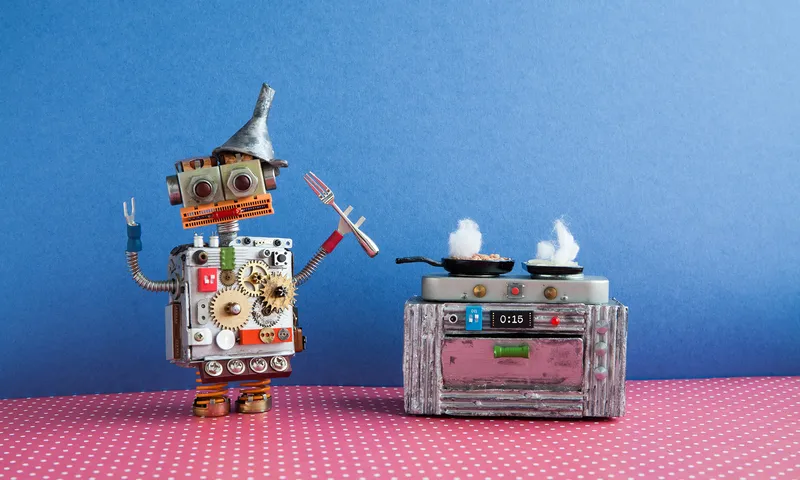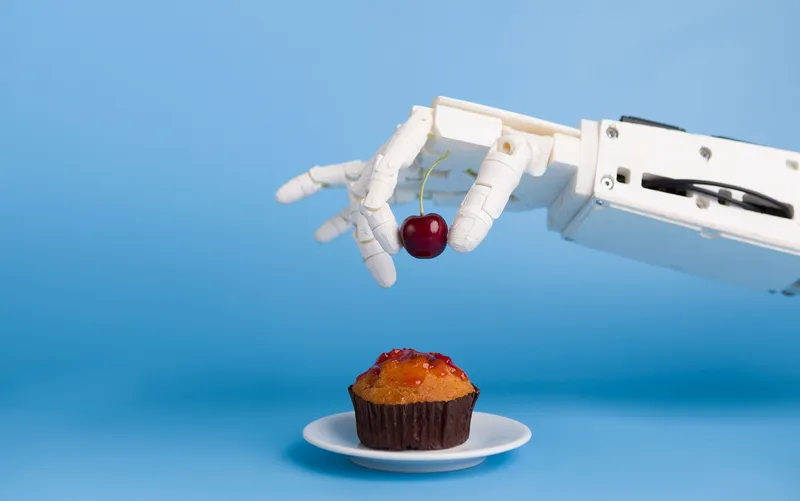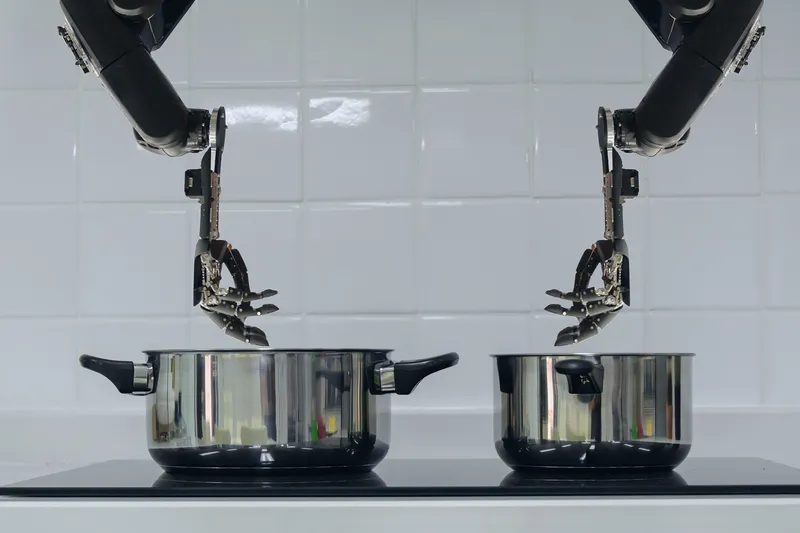Why restaurant owners and chefs in India are still not ready to let AI run their kitchens
Barring piecemeal adoption of AI, restaurant owners in India are hesitant to let this technology cook full-blown meals for they believe nothing can replace the magic of human touch and creativity.
A few months ago, an AI-powered grill from UK-based company Seergrills shot into the spotlight for its ability to cook a perfect steak in just 90 seconds.
The gadget created by Suraj Sudera, a mechanical engineering student from Aston University’s 2015 batch, leverages NeuralFire technology that combines AI with a proprietary cooking system that can whip up at least 50 types of food in under three minutes.
That’s not all.
Another UK-origin company Moley Robotics has launched the world’s first fully robotic kitchen. The device, which is mounted on the ceiling, works in sync with a smart kitchen. A master of many trades, it can adjust temperatures, use the sink, pour ingredients into cooking utensils, and mix them all up. It also comes pre-programmed with recipes and can cook over 5,000 meals.
CaliExpress, a popular burger joint in California, uses a grill robot by Cucina and a robotic fry station called Flippy. According to reports, Cucina can make 100 patties in an hour, while Flippy can cook up to 250 pounds of French fries at the same time.
Meanwhile, Chipotle Mexican Grill, which has a network of over 3,000 restaurants in the United States, is testing out California-based Miso Robotics’ kitchen assistant to automate its chip frying process and improve its quality.

Source: Shutterstock
While restaurants and commercial kitchens in the West are experimenting with AI, back home in India, the new-age technology is still a contentious subject. While some restaurant owners are utilising it to curate menus and strategise marketing initiatives, there seems to be a hesitation in using AI to cook full-fledged meals.
YS Life deep dives to know why.
A labour of love
Many chefs in India believe that while AI may help simplify and streamline certain tasks, particularly in the case of replication and consistency, it lacks the adaptability, cultural understanding, creativity and uniqueness that human minds bring to the table.
Radhika Khandelwal, chef-owner at Radish Hospitality which has Fig and Maple Delhi and Goa under its fold, says the Indian culinary tradition holds a deep reverence for ‘haath ka swad’ or the taste imparted by human touch.
“While AI-integrated appliances may offer efficiency, they can’t replace the nuanced artistry and personal touch that humans bring to the kitchen,” she explains.
“My concern is also that relying too heavily on technology could diminish the authenticity and soul of the dishes we create along with taking away job opportunities. I believe in preserving the traditional methods and personal connection that define our culinary heritage,” affirms Khandelwal.
Chef Suresh DC, brand chef at Hosa, a restaurant in Goa that offers a blend of traditional and modern south Indian cuisine, concurs with this view.
To him, the hustle and bustle, the hands-on action, the emotions, the need to taste and visually assess the presentation, and the ability to adapt recipes based on guests’ requirements are inherently human qualities.
“For me, currently, there seems to be no room for AI in the kitchen; perhaps, I may use it in the future,” he shares.
While technologies like AI can certainly help in areas such as standardising recipes, cooking food is a labour of love, believes Om Nayak, chef and owner of The Pasta Bowl Company, Gurugram.

Image source: Shutterstock
“I certainly believe AI will ensure better quality, improve paperwork, enhance the product design and packaging, and create food and beverage plans that are more saleable. In the kitchen, I am not sure if it will ever come close to the magic of our hands,” he says.
This thought seems to bind the entire food and beverage community.
Several well-known restaurants, such as Virat Kohli’s One8 Commune and Ditas, a modern European restaurant in New Delhi and Mumbai, are not receptive to the idea of having AI in their kitchens.
“While AI in the kitchen sounds cool, it is not the perfect fit for us. There’s no denying that it could help with keeping track of stock or brainstorming new dishes. But when it comes down to it (cooking), our chefs know much better than AI,” remarks Sandeep Gupta, General Manager at Ditas in Mumbai’s Lower Parel.
Partial adoption
While many restaurant owners are reluctant to let AI dominate their kitchens, some restaurateurs have allowed some space–though not a lot–for AI-powered gadgets.
The technology is being used in some restaurants, albeit partially.
“It’s just that we don’t seem to realise it. It has already entered the food and beverage space; the technology is evolving at a rapid pace. But it will take some time for it to dominate the industry,” admits Vijay Arora, Chief Operating Officer (COO) of Suvidha Kitchens, which provides comprehensive kitchen solutions for the hospitality and food service sector.
The company offers basic equipment like gas burners and other appliances like microwaves, induction plates, and the more advanced Rational combi oven that offer a certain level of intelligence.
Arora is of the view that restaurants and hotels will take some time to adopt sophisticated machines; however, the power of AI is already being leveraged in devices like microwaves and coffee makers at a preliminary level.

Image source: Shutterstock
“For instance, a microwave that can bake and has a preset menu has some intelligence. It is computing parameters to carry out the easiest of tasks like defrosting.
“Also, when you go to hotels, one of the most common appliances you see is a Rational oven that can do everything from making biryani to cakes to bulk rice cooking,” Arora points out.
The Second House in Goa, one of the sunshine state’s popular restaurants, uses AI for its design needs. All of its art is AI-generated, right from the paintings on the wall to projection mapping.
But it is not prevalent significantly in its service or food. While the restaurant uses a few machines that drive automation, it does not see AI technology dictating everything in the kitchen.
“We have semi-adopted AI in the kitchen. For instance, we use the Rational oven. It’s quite useful—one doesn’t have to keep checking the temperature or the cooking; that’s because the device will cook exactly to the same precision every time.
“Besides this, there are several chopping and cutting machines available today but we haven’t got them,” says Dishant Pritamani, Founder of The Second House, Goa.
Limitations and apprehensions
The high cost of AI-integrated appliances (ranging between Rs 70,000 and Rs 1,80,000) acts as a huge deterrent to large-scale adoption of the technology.
The initial investment and recurring maintenance expenses may outweigh the benefits of AI, particularly when compared to current labour costs, argues Agnibh Mudi, Corporate Chef at One8 Commune.
“Moreover, AI solutions tailored specifically for the hospitality sector may not yet be readily available in the market,” he adds.
Besides the high cost, there are other concerns associated with the integration of AI with existing workflow and processes in the kitchen.
Mudi is apprehensive about the challenges in ensuring that AI solutions align with the restaurant’s specific needs and standards.
“We have our own set of practices, customer service standards, and operational procedures that contribute to our brand identity and guest experience. Integrating AI systems would necessitate aligning the technologies with our established protocols and ensuring that they enhance, rather than compromise, the quality and consistency of our offerings. That seems a little challenging,” he elaborates.
Pritamani has a similar point of view. He also says widespread adoption by several people for a long enough period of time is needed before AI starts penetrating commercial kitchens in India.
“The technology has not been tried and tested enough. There are several other limitations, especially in creating consistency in dishes,” he adds.
Individual users evince interest
While restaurateurs in India are treading with caution, individual users seem to be taking an interest in AI-powered appliances and cooking assistants, which promise to make cooking a breeze.
Cooking assistant upliance.ai offers tailored recipe recommendations, step-by-step how-to videos, and suggestions for plating techniques. A multifunctional kitchen companion, it also helps with chopping, stirring, kneading, steaming, and cooking diverse dishes.
“It is a single appliance that can replace over 10 kitchen appliances and combines 16 cooking functions. It not only saves space on your countertop but also simplifies the cooking process by offering a centralised hub for end-to-end cooking,” says Mahek Mody, CEO and Co-founder of upliance.ai, which recently appeared on reality show Shark Tank 3.
Ever since it began deliveries in January last year, upliance.ai says it has sold around 800 devices, maintaining a consistent 40% month-on-month growth.
The future may see some many more developments and AI experiments in both commercial kitchens and home kitchens. But as of now the exposure to this sophisticated technology is limited.
Edited by Swetha Kannan







